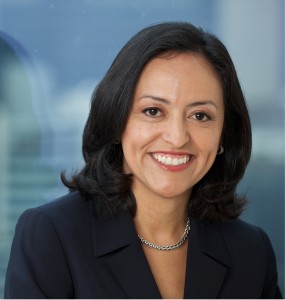 By Jane Carruthers (London)
By Jane Carruthers (London)
How do you define a thoroughly modern heroine? Brave, candid, funny, kind and fantastically good at her job? Well, that’s certainly part of it. It was a job that demanded Marie Colvin took more risks than most people would consider sane, and one that she made peculiarly her own. By her sheer professionalism, personal bravery and awe-inspiring energy Marie Colvin became a legend in the hard-bitten world of war reporting. The newspapers and websites are abuzz with praise for a woman who lived her life to the maximum, working in places closer to a vision of hell than many of us can imagine, and telling the stories of ordinary people so that the world could know about the horrors and the atrocities they faced on a daily basis.
Along with Kate Adie, Christiane Amanpour, and Janine di Giovanni, Colvin crashed the almost exclusively male world of war reporting. Ground-breaking in the latter part of the last century, these women have shown the way to other women who want to pursue their chosen careers without fear of discrimination. Colvin did not do so as a quasi-male. She brought her own brand of femininity to her work, and liked nothing more than having a ritzy manicure and a night out in designer clothes, partying with her large circle of friends when home from an assignment.
Her friends and colleagues speak of someone full of fun, who knew the world’s darkest corners but also how to party – hard. East Timor, Sri Lanka (where she lost an eye), Chechnya, Libya. A roll-call of the horror centres of recent years, and she was there, telling it like it is, like always. Syria was to be her downfall. Murdered in a run-down press HQ in Homs, along with her French photographer Remi Ochlik, she had ‘one more story to file’ and died doing it. Two of her colleagues are still stranded in the bombed-out press centre, injured and desperate to get out.
Yale educated Colvin started her career as a night police reporter with UPI, eventually moving to Europe where she worked in Paris as Bureau chief. She moved to The Sunday Times in 1985 and became Middle East correspondent in one of the most turbulent periods in the region. She could be relied upon to get the scoop, even winning an unheard-of interview with Colonel Muammar Gaddafi in 2011.
Award-winning and highly respected around the world for her hard-hitting coverage, her successes came at great personal cost: she lost an eye when she came under fire from the Sri Lankan government forces in an RPG attack, and suffered post-traumatic stress disorder for a year, requiring hospitalisation. Her three marriages failed. Vaughan Smith, founder of the Frontline Club in London, where Colvin and her friends would congregate to relax between assignments, said: “She had a tough time. You cannot live a normal life with her job.”
Friend Virginia Bonham Carter, who knew Colvin for over 30 years, said that she managed to combine being brave and serious with incredible joie de vivre and energy for fun: “Marie connected with virtually every person she met.”
Colvin was not shy of using her considerable style and charm to gain entry to some of the most influential offices in the world. When working in the Middle East, she followed the more modest dress code required. A Moslem friend taught her how to tie the hijab around her neck properly, but Colvin insisted that she got better interviews if she showed a bit of cleavage. With Colvin, it was never a sacrifice of personal integrity – but she would – and did – push with every fibre of her determination to get the quote, get the story, file the scoop.
To ask the question “what does it mean to be an intrepid woman?” you need to little more than to read Marie Colvin’s resume. She embodied excellence, passion and humanity.
Much of the coverage of her death dwells on her gender, which is perhaps not surprising given her working world. Perhaps the greatest honour we could do her would be to ensure that it is not her gender for which she will be remembered, but her professionalism and her passion.
 By Melissa J. Anderson (New York City)
By Melissa J. Anderson (New York City)
 By Melissa J. Anderson (New York City)
By Melissa J. Anderson (New York City) By Melissa J. Anderson (New York City)
By Melissa J. Anderson (New York City) By Melissa J. Anderson (New York City)
By Melissa J. Anderson (New York City)
 Contributed by Kelly Cepeda
Contributed by Kelly Cepeda By Robin Madell, San Francisco
By Robin Madell, San Francisco
 By Melissa J. Anderson (New York City)
By Melissa J. Anderson (New York City) By Jane Carruthers (London)
By Jane Carruthers (London)